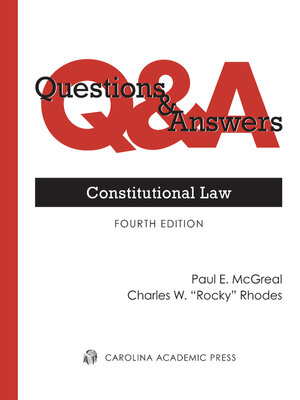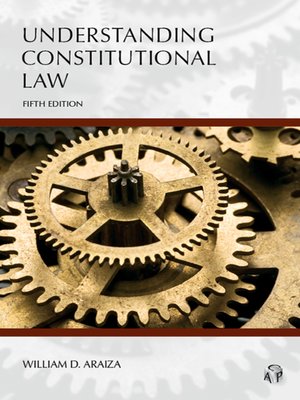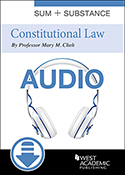 Examples and Explanations for Constitutional Law: Individual Rights
by
Allan Ides, Christopher N. May, Simona Grossi
Examples and Explanations for Constitutional Law: Individual Rights
by
Allan Ides, Christopher N. May, Simona Grossi
ISBN: 9798894101873
Publication Date: 2024-12-05
Examples & Explanations for Constitutional Law: Individual Rights, 10th edition, by Allan Ides, Christopher N. May, and Simona Grossi, provides a clearly written, comprehensive examination of constitutional doctrine pertaining to individual rights. This problem-oriented study guide provides students and teachers with a highly readable and accessible study of constitutional law. Both this book and its companion volume, Examples & Explanations for Constitutional Law: National Power and Federalism, combine detailed textual material with real-world examples and explanations that apply the relevant constitutional doctrine to specific fact patterns. The text operates as a readable and citable treatise on the topics covered, and the examples and explanations serve as an elaboration on that text. Its unique, time-tested Examples & Explanations pedagogy combines clear textual material with well-written, comprehensive and up-to-date examples, explanations, and questions. A favorite among law school students, and often recommended by professors, this guide takes students through the principal doctrines of constitutional law covered in a typical course that includes a study of individual rights.
New to the Tenth Edition:
Inclusion of nearly 50 new Supreme Court cases, and more than 30 state and lower federal court decisions
Nearly 200 Examples & Explanations, many of them new and updated
Analysis of Dobbs v. Jackson Women’s Health Org. (2022), overruling Roe v. Wade (1973), and leaving any protection of a woman’s right to terminate her pregnancy up to the states
Discussion of how state courts, applying state constitutions, have responded to the Court’s invitation in Dobbs
Consideration of Students for Fair Admissions v. Harvard College (2023) and the Court’s new, less deferential approach to race-based college admissions programs
Expanded treatment of race-based legislative districting plans, including Alexander v. S.C. State Conf. of the NAACP (2024)
Discussion of freedom of speech in the social media setting, as exemplified in recent decision in Moody v. NetChoice, LLC (2024)
Exploration of the current Court’s approach to resolving Establishment Clause claims, as set forth in Kennedy v. Bremerton School Dist. (2022)
Updated treatment of the right to keep and bear arms, as seen in New York State Rifle & Pistol Ass’n v. Bruen (2022) and United States v. Rahimi (2024)
Professors and students will benefit from:
Hypotheticals similar to those presented in class, with structure and reasoning behind the corresponding analysis
An alternative perspective to help you understand your casebook and in-class lectures
Straightforward, informal text that is never simplistic, and quickly gets to the point in conversational style laced with humor
Adaptability with all major Constitutional Law casebooks
Authors with over 75 years of combined experience teaching Constitutional Law

 Questions & Answers: Constitutional Law
by
Paul E. McGreal, Charles W. "Rocky" Rhodes
Questions & Answers: Constitutional Law
by
Paul E. McGreal, Charles W. "Rocky" Rhodes
 Understanding Constitutional Law
by
William D. Araiza
Understanding Constitutional Law
by
William D. Araiza
 Sum and Substance Audio on Constitutional Law
by
Mary M. Cheh
Sum and Substance Audio on Constitutional Law
by
Mary M. Cheh
 Quick Review of Constitutional Law
by
Philip Prygoski; Daniel Ray
Quick Review of Constitutional Law
by
Philip Prygoski; Daniel Ray
 Constitutional Law Cold Call Companion
Constitutional Law Cold Call Companion
 Emanuel CrunchTime for Constitutional Law
by
Steven L. Emanuel
Emanuel CrunchTime for Constitutional Law
by
Steven L. Emanuel
 Constitutional Law: In Other Words Audio Series
Constitutional Law: In Other Words Audio Series
 Constitutional Law: In Other Words Video Series
by
Susan Carle
Constitutional Law: In Other Words Video Series
by
Susan Carle
 Aspen Aloud: Constitutional Law
Aspen Aloud: Constitutional Law
 CALI Lessons: Constitutional Law
CALI Lessons: Constitutional Law